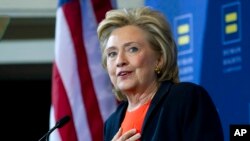Hillary Clinton, the leading 2016 Democratic Party U.S. presidential contender, called Monday for a "sensible" overhaul of U.S. gun control laws in the aftermath of the country's latest deadly mass shooting.
At a campaign appearance in New Hampshire, the former secretary of state vowed that if elected she would use her executive power to expand background checks of gun buyers at gun shows and online.
Clinton also proposed repeal of a law that shields gun manufacturers, distributors and dealers from most liability lawsuits, even in cases such as last week's assault at an Oregon community college where a gunman killed nine people.
"I will try every way I can to get those guns out of the hands of people who shouldn't have them," she said. "How many people have to die before we actually act, before we come together as a nation?"
Clinton's foray into trying to change U.S. gun control laws puts her at odds with her Republican Party presidential opponents, who have expressed sympathy for the families of the victims of the Oregon rampage, but do not support stricter gun control laws. They called for better mental health programs to search for warning signs about people who might be inclined to carry out a mass shooting.
Gun ownership in the United States is enshrined in the country's constitution. President Barack Obama has deplored the mass killings, often at schools, churches and movie theaters, but his efforts to enact tougher background checks have been thwarted by the powerful gun lobby and like-minded lawmakers opposed to new restrictions.
"We've become numb to this," Obama said after the Oregon shooting.
One of Clinton's Democratic opponents, Vermont Senator Bernie Sanders, said after the shootings that the country needs "sensible gun control legislation" along with better mental health help. He also supports ending the so-called gun show loophole as well as banning the sale of automatic weapons.
But for Republican candidates, the response to mass shootings is not to enact more laws they say would not stop the next shooter from obtaining a gun.
Billionaire Donald Trump, who has led the Republican field for several months, told NBC's Meet The Press on Sunday he could argue that if more people were armed at the community college where Thursday's attack took place, then fewer people would have died.
"If you had more guns, you'd have more protection because the right people would have the guns," he said. Trump added that mentally ill people will "come through the cracks" and "do things that people will not even believe are possible."
Republicans generally oppose legislation that restricts the ability of Americans to purchase and own guns, basing their position on the Second Amendment to the U.S. Constitution that legitimizes "the right of the people to keep and bear arms." Much political debate and many legal cases have explored the precise meaning and its application more than 200 years after the Constitution was ratified.
The Supreme Court last tackled the issue in a major 2008 ruling that backed the right to possess a firearm and use it "for traditionally lawful purposes, such as self-defense within the home."
Senator Marco Rubio, a Republican presidential contender, said Friday that adding more restrictions on gun ownership would prevent people from defending themselves.
"Criminals don't follow gun laws," he said. "Only law-abiding people follow gun laws, and there is just no evidence that these gun laws would prevent these shootings."
Neurosurgeon Ben Carson, running second behind Trump in political surveys, also said Friday that gun control only places limits on those who follow the law. "It doesn't work for crazies," he said.
Meanwhile, former Hewlett-Packard CEO Carly Fiorina says the government should focus on enforcing laws that are already in place before jumping to add new ones.
Clinton's proposals are unlikely to gain support from the Republican field, but even her plans lag behind another Democrat, former Maryland Governor Martin O'Malley, who has an extensive list of gun reforms he would like to enact.
O'Malley agrees on tightening background checks, and wants to require a license, fingerprinting and safety training for anyone who buys a gun. He also wants a federal firearms registry, increased inspections of gun dealers, and to use the government's role as a major gun buyer to push manufacturers to make all guns more traceable.




